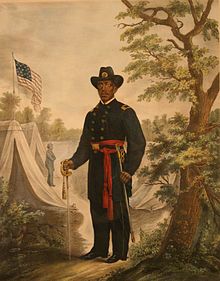
African-Americans Calling Out Slavery
As the abolitionist movement escalated throughout the 1850s America, so did the clouds of inevitable civil war over the issue of slavery - an institution so integrally tied to every sphere of the Southern economy and social order. Hundreds of African-Americans became outspoken activists in the great struggle. These advocates served this cause in numerous ways, and all had differing notions how to achieve their long-sought goals .
Frances E. Harper was one such individual enrolled in the latter abolitionist movement. Not only was she focused on the demise of slavery, but other social spheres and causes and well. In her many decades as an African-American advocate, she not only called for civil rights and freedom, but more available forms of education, women’s suffrage rights, and prohibition. She practiced her advocacy not only in public arenas and articles, but poetry as well. In her poetic work, “Bury Me in a Free Land,” Harper makes clear her intentions (and her race’s) to be free and equal citizens, even in death: "But not in a land where men are slaves...."
In one of her many other writings, The Colored People in America, Harper makes her intentions even clearer to the reader. There is more to rights than having the right (for men) to vote or voice their opinions in public. One has the right to an education, to create, to think and feel without fear of repercussions or ridicule. There is hope for their future she says: “blessed be God!” for our down-trodden race. Public and private schools accommodate our children....We have papers edited by colored editors....we have a church that is extending itself from east to west....shall we not hope?”
At the same time, the equally prominent abolitionist Martin R. Delany too was fighting for similar yet also differing ideals in African American freedom. To state it lightly, Delany was a true intellectual, capable of excelling in nearly ever field he entered or studied. As a gifted writer, orator, editor, and student of medicine, he did much to advance the perception that African Americans could succeed and excel when given the opportunity to do so. His black/abolition oriented paper, The Mystery, further spread his word and ideology to a far wider audience. In the Civil War, Delany overcame incredible racial and political odds to rise to the rank of major in the Union Army. For such efforts, Abraham Lincoln would write to Secretary of War Edwin Stanton in February 1865: "Do not fail to meet this extraordinary and intelligent black man." Despite such courteous words, Delany's plea to Stanton to more actively recruit black troops largely fell upon deaf ears. Nevertheless, he helped command the 52nd USCT and later vigorously worked with the Freedman's Bureau until his resignation from the Army in 1865.
Delany was one of the first great advocates of Black Nationalism in America. While many abolitionists argued there was no true difference between the races, Delany stated otherwise: “...we are not identical with the Anglo-Saxon or any other race of the Caucasian or pure white type of the human family, and sooner we know and acknowledge this truth the better for ourselves and posterity.” In other words, Delaney believed African-Americans should set their sights on realistic goals of their time in order to build a solid foundation for future generations to achieve fuller realizations and realities of equality.
Throughout his writings, Delany makes reference to Egypt and Biblical tales of similar struggle, stating that the American slave suffered the same plight of Moses’s people - yet they too would one day reach "the promised land." In addition, he was never afraid to call out the injustices he witnessed throughout his lifetime. He wrote, “In the United States...the color of blacks is a badge of degradation, acknowledged by statue, organic law, and the common consent of the people.” Thanks to the works of people such as Harper and Delany, we as a nation have hopefully begun to surpass such antiquated notions.

 African-Americans Calling Out Slavery
African-Americans Calling Out Slavery

No comments:
Post a Comment